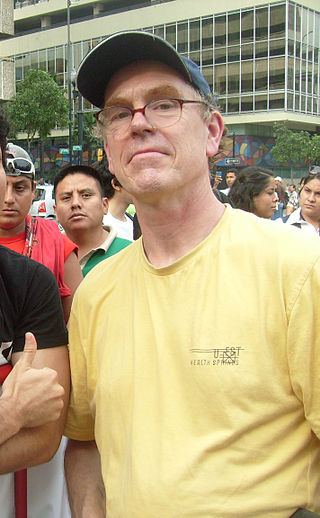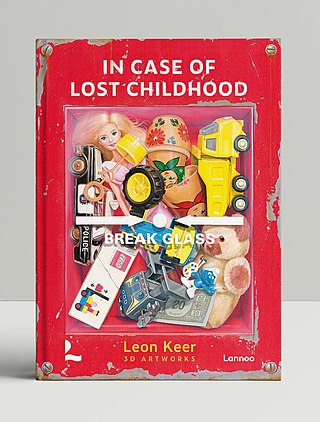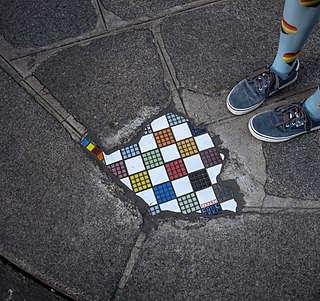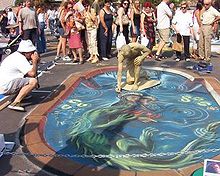
Sarasota is a city in and the county seat of Sarasota County, Florida, United States. It is located in Southwest Florida, the southern end of the Greater Tampa Bay Area, and north of Fort Myers and Punta Gorda. Its official limits include Sarasota Bay and several barrier islands between the bay and the Gulf of Mexico. Sarasota is a principal city of the Sarasota metropolitan area. According to the 2020 U.S. census, Sarasota had a population of 54,842.

Body painting is a form of body art where artwork is painted directly onto the human skin. Unlike tattoos and other forms of body art, body painting is temporary, lasting several hours or sometimes up to a few weeks. Body painting that is limited to the face is known as face painting. Body painting is also referred to as "temporary tattoo". Large scale or full-body painting is more commonly referred to as body painting, while smaller or more detailed work can sometimes be referred to as temporary tattoos.

Julian Beever is a British sidewalk chalk artist who has been creating trompe-l'œil chalk drawings on pavement surfaces since the mid-1990s. He uses a projection technique called anamorphosis to create the illusion of three dimensions when viewed from the correct angle. He preserves his work in photographs, often positioning a person within the image as if they were interacting with the scene.

Anamorphosis is a distorted projection that requires the viewer to occupy a specific vantage point, use special devices, or both to view a recognizable image. It is used in painting, photography, sculpture and installation, toys, and film special effects. The word is derived from the Greek prefix ana-, meaning "back" or "again", and the word morphe, meaning "shape" or "form". Extreme anamorphosis has been used by artists to disguise caricatures, erotic and scatological scenes, and other furtive images from a casual spectator, while revealing an undistorted image to the knowledgeable viewer.

Street art is visual art created in public locations for public visibility. It has been associated with the terms "independent art", "post-graffiti", "neo-graffiti" and guerrilla art.

The Central Pennsylvania Festival of the Arts, officially abbreviated as CPFA, is held each summer in State College, Pennsylvania and on the main campus of Pennsylvania State University. Penn State students and locals commonly refer to the event as Arts Fest.

Sidewalk Sam is the pseudonym of Robert Charles Guillemin, a Boston-based artist who resided in Newton, Massachusetts. He is best recognized for his reproductions of European masterpieces, chalked or painted on the sidewalk. Following an accident in 1994 that left him paralyzed, Guillemin increased his focus on large participatory art projects for communities and businesses. His motto, on a stickie at the top of his computer, was "Entertain, Inspire, Empower and Unite".
Melanie Stimmell Van Latum, born 1975 in Los Angeles, is an international 3D street painter and fine artist specializing in large scale chalk art and Renaissance-style inspired imagery.
William Wolk was an American realist painter working in West Virginia. From 1984 through 2008, he hosted his namesake one-man gallery at The Greenbrier, a 6,500 acre resort. His primary working studio was maintained in West Virginia till 2008. William Wolk Fine Art is now located in Sarasota, Florida.
Via Colori is a street painting festival held in several cities in the United States to raise funds for not-for-profit organizations. Hundreds of artists, usually sponsored by a business or individual, gather and create large-scale artworks on the street using chalk. After expenses, the money raised goes to the not-for-profit organization to help further its mission.
Avenida de Colores, Inc. was founded in 2010 by Denise Kowal as a 501(c)(3) nonprofit corporation, based in Sarasota, Florida in the United States. The corporation produced the Sarasota Chalk Festival, a cultural event designed to celebrate the sixteenth century performance art of Italian street painting.

Sarasota Chalk Festival is an American cultural event of public art that celebrates a performing art form of pavement art also known as Italian street painting. It was founded in Sarasota, Florida by Denise Kowal. During the festival artists use chalk, and occasionally special paint, to paint the road surface to create large works of art while the viewer can watch the creative process. The festival is focused around the street artists who are known as Madonnari in Italy or commonly referred to Street Painters, Chalk Artists, Sidewalk Artists, or Pavement Artists. The festival is held annually in downtown Sarasota in Burns Square.

Tracy Lee Stum is an American artist best known for her 3D street paintings or chalk drawings making use of anamorphosis. In 2006, she held Guinness World Record for the Largest Chalk Painting by an individual.
Edgar Müller is a 3D street artist,
Ego Leonard is a Dutch painter and sculptor, and possibly an anonymous guerrilla artist, whose works prominently feature outsized Lego figures. Sometimes the name also is applied to sculptures, apparently made by Leonard, which have been found on beaches at various locations in the world since the late 2000s. The sculptures are in the form of "minifigures", but are constructed from fibreglass enlarged to two and a half metres in height, and have the message “No Real Than You Are” in capital letters written on their torsos. The appearance of an "Ego Leonard" giant figure on Siesta Beach, Florida, became number two on the Time list of the "Top 10 Oddball-News Stories of 2011." It is unclear whether Ego Leonard is the name of a person or merely a fictional character as the figure, but it is most likely a fictional name, as Ego Leonard can be reworked to read L, Ego or LEGO. The letters can also be rearranged to spell "A LEGO drone".

Leon Keer is a Dutch pop-surrealist artist. He has created work on canvas and (3D) artwork on the streets across the world. Leon Keer is a leading artist in anamorphic street art. His art has been showcased in Europe, the United States, Russia, Mexico, the United Arab Emirates, Australia, New Zealand, and several Asian countries. In addition to using optical illusion, he often presents his art by adding new technologies, such as augmented reality and video mapping. The art is temporary, but the images are shared all over the world via social media.
The Pasadena Chalk Festival is an American cultural event of street painting. It was founded by the Light Bringer Project in 1993. During this festival, artists create temporary masterpieces in chalk on the streets, including original works, masterpiece recreations, movie posters and iconic scenes recreations, 3D realistic works, animation art, modern abstractions, and more. The festival is held annually in downtown within the Paseo Pasadena, California. In 2010, the Pasadena Chalk Festival was officially named the Largest Display of Chalk Pavement Art by Guinness World Records, and attracted more than 600 artists and 100,000 visitors in one weekend. Here artist can be seen in a wide range of all ages expressing there different levels of skill and appreciations for the show.

Ememem is an anonymous French street artist based in Lyon. They create mosaics incorporating geometric motifs in cracked sidewalks and façades, a process they call flacking. Ememem creates art at night, so that it is generally discovered at dawn.

Sidewalk chalk is typically large and thick sticks of chalk that come in multiple colors and are mostly used for drawing on pavement or concrete sidewalks, frequently four square courts or a hopscotch boards. Blackboard chalk, typically used in educational settings, is shorter and thinner than sidewalk chalk.


















